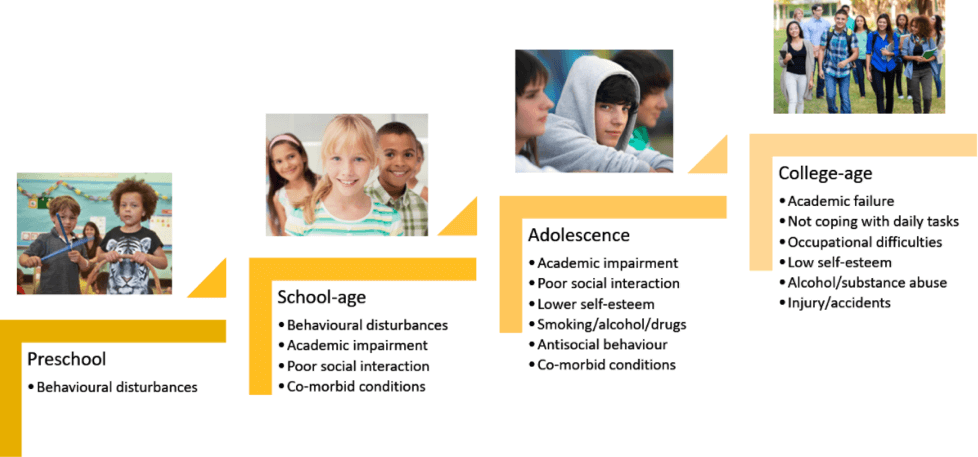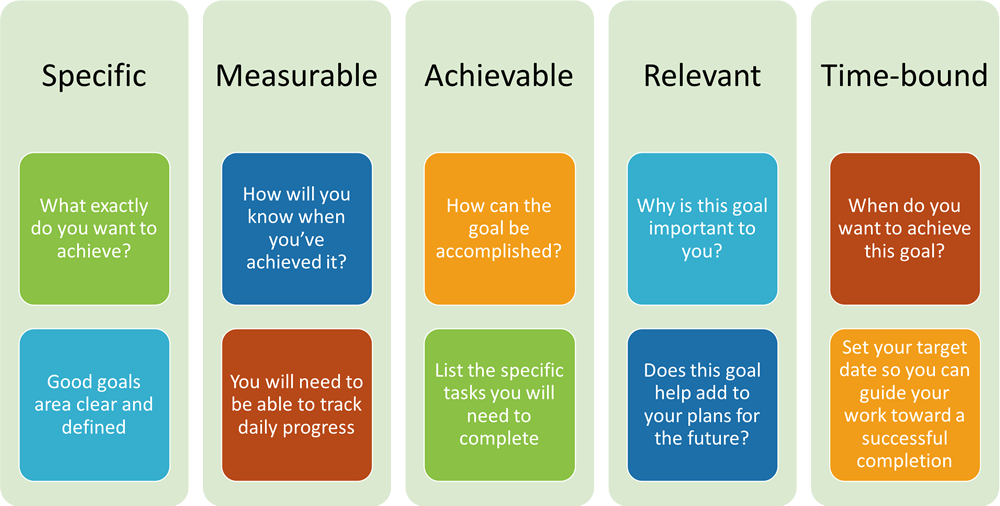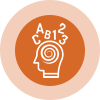Managing LDs & ADHD in Adults
For adults living with diagnosed or suspected Learning Disabilities and/or ADHD, these challenges affect life at school, work, home, or in social settings.
What Can You Do?
- Understand your brain’s differences
- Implement strategies to manage your brain’s differences and capitalize on your strengths
- Find Help when you need it

Until recently, scientists thought that when children reached adulthood most of them would outgrow their ADHD symptoms. Now it is recognized that for a large percentage of people, ADHD will be a lifelong condition – and if left undiagnosed or untreated, ADHD in adults may impact many aspects of their lives. Although challenges exist for people living with ADHD, there is much to be hopeful about.
Although it is not possible to self-diagnose conditions like ADHD, you may be wondering if in fact you do have ADHD. This section will help you to understand the common ways that ADHD presents and link you to some resources to help you to follow-up.
- In a large survey, 75% of adults with ADHD were not diagnosed as children (Kessler R et al, 2006).
This may be largely due to the common myth that ADHD presents mainly in boys as loud, distracted, impulsive, overly active, and disruptive behaviours.
- been the quiet daydreamer (inattentive)
- fidgeted a lot or constantly in smaller ways (chewing hair, bouncing your leg, tapping, shifting in your chair, playing with jewelry, etc.)
- worked much harder to get passing grades
- avoided tasks by chatting with classmates
- made impulsive social decisions which impacted your friendships
- engaged in impulsive/risky sexual behaviour as a teen
- had difficulty controlling your spending
- been diagnosed with anxiety, depression, OCD, etc. instead
Living with undiagnosed and untreated ADHD may affect your mental health, lower your self-esteem, interfere with relationships and employment, and may negatively impact your overall quality of life.
ADHD Symptoms as an ADULT may include more-than-average difficulties regulating any combination of the following:
Focus:
- Difficulty maintaining attention
- Difficulty listening
- Overly focused for long periods of time
- Difficulty completing a tedious or uninteresting task or assignment
- Being easily bored or distracted
- Needing a lot of stimulation and novelty
Time:
- Being forgetful
- Poor sense of time passing
- Unable to properly estimate how long something will take to do
- Missing deadlines or appointments
- Often running late or rushing
Organization:
- Having disorganized or messy spaces
- Difficulties with day-to-day responsibilities
- Losing things
- Not remembering where things are
- Difficulty planning ahead
- Inconsistent performance at work
Emotions:
- Very sensitive to other people’s reactions or comments
- Easily have hurt feelings
- Often feeling overwhelmed
- Seem to feel things more intensely than others
- Relationship problems
Impulsivity:
- Constant activity or restlessness
- Making impulsive decisions which are later regretted
- Impatient; difficulty waiting for your turn
- Impulse spending
- Tending to say or do things without thinking
- Interrupting other people’s activities or conversations; blurting out inappropriately
These are a few resources to get you started in your quest to see if you may have ADHD. A proper assessment will need to be done by a physician or psychologist. If you have completed an ADHD Symptom Checklist, bring it with you when you see a physician or psychologist.
An assessment for ADHD can be conducted by a physician, psychologist or registered clinical social worker.
Because ADHD is considered a medical (neurobiological) condition, it can be partially treated with medication so it can be beneficial to involve a family doctor, psychiatrist, or neurologist.
If you start the process with your family doctor, ask questions to see how knowledgeable the doctor is about ADHD in adults or if a referral to another physician, psychiatrist or neurologist with expertise in ADHD is warranted. Family physicians typically have less expertise in diagnosing and treating ADHD than pediatricians do.
Physicians will likely start with a complete physical and a thorough medical history, family history, and a psychiatric history to determine if other conditions, such as a thyroid problem, anxiety, or depression, exist or might explain your symptoms. It can help to complete one of the Adult ADHD symptom checklists (see above) to bring with you to your first appointment with your doctor. They may also provide you with checklists and rating scales in the diagnosis process.
Cost: No cost in Canada. Assessments and treatment by a medical professional are covered by provincial health care plans in Canada.
Note that wait lists to see adult specialists can be quite long, although many family doctors will conduct these assessments.
Psychologists who specialize in ADHD can diagnose ADHD, although they cannot conduct the physical/health assessment component, nor can they prescribe ADHD medication.
Benefits of a psychologist completing a psycho-educational assessment are:
- A full psycho-educational assessment can determine if other conditions such as a learning disability exist, which is quite common. The assessment report will give you a picture of your full learning profile, including your challenges and also your natural strengths and aptitudes.
- Psychologists can help you to learn strategies to manage your ADHD.
- Psycho-educational assessments are particularly helpful for adults who plan to or are attending university and need their profile information, particularly when it comes to seeking out accommodations.
- Some adults may benefit by having a psycho-educational assessment done for workplace accommodations.
- Psychologists may also uncover and provide treatment for related challenges, such as anxiety and depression.
Costs: Unless you can access a psychologist through the health system, psychology services are not covered through provincial health care plans in Canada. Most private extended health care plans will cover psychological services. Some agencies offer sliding scale rates for psychological services if you qualify.
Characteristics of ADHD Can Change Through Life’s Stages
ADHD symptoms and their severity are not set in stone, but rather, can shift throughout an individual’s life. Each phase of our development holds different experiences and demands. Oftentimes, it is when these demands increase that the symptoms of ADHD become more apparent. For most, it’s the demands of the classroom that raise the red flags. For others, it’s the demands of a workplace, a marriage, parenting, etc.
Challenges seen during the childhood years continue to have an impact throughout various aspects of life, such as following through on responsibilities, maintaining supportive relationships, and work performance. It is important to note that ADHD diagnosis in adults requires only 5 symptoms (instead of 6 for individuals under the age of 18) to be present in order to meet diagnostic criteria for ADHD diagnosis in adults.
The characteristics of ADHD change throughout development:
- Hyperactive/impulsive symptoms are more visible in very young children and tend to “mellow out” over time. However, significant hyperactivity and impulsivity are still observed in some adults with ADHD, and particularly in those with substance abuse and antisocial behaviour.
- Inattentive symptoms become more apparent in adolescence and continue into adulthood.
When left untreated, unsupported, and misunderstood, the impact of ADHD evolves over the child’s development. Ideally, children are diagnosed early in their school-aged years in order to increase their chances of success over their lifetime. Research into this area indicates that untreated ADHD can lead to lower outcomes in all areas of their life: academics and employment, antisocial behaviours, higher risks of injury when driving, addictive behaviours, and lower self-esteem.

Preschool
• Behavioural disturbances

School-age
• Behavioural disturbances
• Academic impairment
• Poor social interaction
• Co-morbid conditions
Adolescence
• Academic impairment
• Poor social interaction
• Lower self-esteem
• Smoking/alcohol/drugs
• Antisocial behaviour
• Co-morbid conditions


College-age
• Academic failure
• Not coping with daily tasks
• Occupational difficulties
• Low self-esteem
• Alcohol/substance abuse
• Injury/accidents

You may have heard at one time that most children outgrow ADHD when they are adults. However, it is now known that most children with ADHD develop into adults with ADHD. Although symptoms may present differently or change with age, they rarely go away all together.
The good news is that you likely have a better understanding of ADHD by now, you are recognizing how those symptoms are impacting you as an adult, and hopefully you have a game plan in place to manage those behaviours. Make sure you stick with it!
If you are a young man with ADHD, it is very important to get a handle on those ADHD symptoms that can so easily derail you, particularly at this stage of your life. As you might suspect by now, some teenage guys and young men are at a higher risk for all kinds of behaviours that negatively impact their world. When you add an impulsive ADHD brain to the equation, the risk factors increase – a lot! And unfortunately, the ADHD brain takes longer to mature, two to three years longer than your peers without an ADHD brain.
Youth and young adults (young men especially) with ADHD are at a higher risk for:
- Not completing high school or post-secondary school
- Struggling to hold onto jobs
- Driving issues, such as speeding and car accidents
- Substance abuse and other addictions
- Getting into trouble with the law
- Being involved in an unplanned pregnancy
Fortunately, with treatment & strategies in place, you can minimize your risks for life to go sideways, and you can enjoy these years.
When young women with ADHD are expected to be more independent, either at post-secondary or in work environments, if they do not have supports and strategies in place, then they are likely to feel overwhelmed. Women are more likely to be diagnosed with ADHD during adulthood than men; first because they were not diagnosed as children, and second because at this stage they might be struggling with the impact of ADHD symptoms, feel the effects of ADHD on their lives, and seek out support.
Young women with ADHD are at higher risk than peers for:
- Anxiety and depression
- Struggling to keep up with academic demands at post-secondary
- Eating disorders
- Substance use disorders
- Unplanned pregnancy
Most individuals with ADHD have weak Executive Functioning skills. This means they might have trouble with staying organized, time management, completing tasks, multi-tasking, and more.
Women, and mothers in particular, are often expected to be the planners and organizers of the family and to keep the household running smoothly. These expectations may be layered on top of work commitments. Juggling family/home and work can be challenging for everyone, and is particularly difficult for women with ADHD. Sometimes it is not until one of their own children is diagnosed with ADHD that mothers start to question if they may have ADHD as well. Fortunately, there is now a real shift in understanding ADHD in adulthood, so the diagnosis, treatment and supports are more readily available.
For many who are juggling life, work, and possibly families it can be difficult to keep all the balls in the air without dropping a few. This may be especially true for those with ADHD, where deficits in executive function skills impact many aspects of their world.
At times it can be hard to stay on top of:
- Finances (“Woa, this visa bill is way bigger than I expected!)
- Being on time for work or appointments (“Shoot, late again!”)
- Meeting deadlines (Was that due today?”)
- Car payments & insurance (Sorry officer, I didn’t realize my insurance had expired.”)
- Home maintenance (“When are you going to fix that leaking faucet?”)
- ETC!
Staying on top of it all can be overwhelming for a person with ADHD. Of course, you want to develop strategies to minimize these challenges.
But don’t beat yourself up! Recognizing that ADHD is a brain-based condition resulting in delayed brain maturation instead of a lack of intelligence, laziness, lack of motivation, etc. can help you to accept that you are nor flawed and to be gentle with yourself. It can also open so many doors to receiving supports and accommodations you need to deal with your ADHD symptoms and increase your success at home, at school, and at work!
Navigating the Life Stages of ADHD: Key Concerns and Strategies for Diagnosing and Treating Adults with ADHD. (podcast & video). By ADDitude.
CHADD Article: Teens and Young Adults
Additude Article: Grow UP Already! Why it Takes So Long to Mature
Resource – ADHD Women’s Palooza: An extraordinary week of insight and answers exclusively for ADHD women, presented by more than 30 experts every year via audio and video presentations. You can get the replays of the presentations.
ADHD in Girls and Women; How to Recognize the Signs & Symptoms. By psyccom.net
How ADHD Affects Women. Later Diagnosis, Risk-Taking, etc. By webmd.com
Juggling Work and Life with Adult ADHD; ADHD Support Talk Radio Podcast
Juggling Work and Life with Adult ADHD
ADHD Parent Palooza: In a yearly video conference, top experts share their wisdom on ADHD and Parenting. (Some parents of children with ADHD may also have ADHD, so learning strategies to tackle ADHD can help the whole family!)
ADHD Treatment & Strategies
We’ve laid out a picture of some ‘worst-case scenarios’ above – but this is only more likely to happen if you don’t have a diagnosis and treatment in place. The good news about ADHD is that with a diagnosis, treatment, strategies, and supports in place, ADHD can be managed and managed well. And remember to focus on your strengths!
Medication may be considered as part of a treatment plan, in combination with counselling and implementing strategies. You will want to work closely with your physician to find the medication that works best for you
Research indicates that untreated ADHD is associated with poor academic outcomes, unemployment, financial difficulties, poor social outcomes, increased relationship difficulties and increased mental health issues.
Experts in the field of ADHD agree that medications are the most well-established and widely used treatment for ADHD. Research indicates that individuals with ADHD who are treated with appropriate medication have an increased ability to regulate themselves improving their life outcomes and a reduced risk for negative life outcomes (substance-use disorders, depression, criminality, serious traffic accidents, etc.).
The goal of medication treatment is to deal with the symptoms that are preventing you from reaching your potential. ADHD medications affect the amount of neurotransmitters or their related processes in the brain.
ADHD medications may help you to:
- Concentrate and focus
- Make less impulsive decisions
- Stop and think before acting and speaking
- Get more work done
- Increase the opportunity to build pro-social behaviours necessary for healthy relationships
In Dr. Russell Barkley’s book, Taking Charge of Adult ADHD, he notes research has indicated that medication can improve ADHD in up to 80% of individuals or more. Dr. Barkley said: “We now know that ADHD medication can normalize the behavior of 50-65% of those with ADHD and result in substantial improvements, if not normalization, in ANOTHER 20-30% of people with the disorder.”
Given such high effectiveness results, it is often worth trying medication as part of a treatment plan.
No, pills don’t teach skills! Research has repeatedly demonstrated that a combination of medication and behavioral treatment of ADHD provides the highest chances of symptom improvement and general success. Medications can be one part of a treatment plan, in addition to skills training, diet and exercise, behaviour modification plans, counselling, etc.
There are different types of ADHD medications which target various aspects of your brain’s functioning. Unfortunately, there is no way to know ahead of time which type of medication will work best for you.
Therefore, your doctor will suggest a medication trial to see if it will help improve symptoms and determine their impact on your world. A trial lets you see how a medication affects you so that you can make an informed decision about whether it is useful or not.
If one type of ADHD didn’t work for you or had unsustainable side effects, don’t give up! Sometimes you will need to trail a different type of ADHD medication until you find what works best for you.
If you are having a hard time coping with ADHD symptoms and/or if you are struggling with anxiety, depression or other mental health issues, then the first step may be to discuss your concerns with your doctor or access Mental Health Services in your region.
If your issues are significant, your doctor may refer you to a psychiatrist or a specialized agency that requires a referral.
Otherwise, you can access most mental health practitioners, such as a psychologist, directly without a referral.
Counselling sessions with a psychologist or psychiatrist experienced in both ADHD and mental health challenges can provide support for ADHD and co-related challenges.
A specialist such as a psychologist may use an approach like cognitive behavioural therapy to help you to develop skills to regulate your thought patterns and behavior. Changing your thought patterns from negative to more constructive approaches for dealing with life’s challenges can in turn improve your mood and self-confidence and reduce anxiety. Changing your approach to how you do things can make your life easier and less stressful.
Strategies used consistently will help you to:
- Feel better, both physically & mentally
- Get things done more efficiently
- Keep yourself on-task
- Stay organized
- Manage your time better
- Maintain your motivation
Counselling can also help you to learn strategies to develop more positive relationships with family, friends, and co-workers.
Since these people are likely a large part of your everyday life, it is important for them to also understand how ADHD affects you. Counselling can teach you to self-advocate and explain to others how ADHD impacts to your life.
Start by establishing healthy daily habits as they often have outsized positive effects for individuals with ADHD.
- Eat regularly
- Eat well
- Get a good nights sleep
- Exercise daily
ACTION PLAN
We are fortunate to be living in a time where there is an explosion of information about ADHD, including strategies for adults to manage ADHD Executive Function challenges. But it can all be a bit overwhelming! How do you get started?
Take a step back, evaluate what your needs and goals are, and come up with an ACTION PLAN.
Using the S.M.A.R.T. Goals template below may be helpful.
Specific
What exactly do you want to achieve?
Good goals area clear and defined
Measurable
How will you know then you’ve achieved it?
You will need to be able to track daily progress
Achievable
How can the goal be accomplished?
List the specific tasks you will need to complete
Relevant
Why is this goal important to you?
Does this goal help add to your plans for the future?
Time-bound
When do you want to achieve this goal?
Set your target date so you can guide your work toward a successful completion

Start the process off by doing a self-evaluation.
- In what areas of life does ADHD impact you the most?
- In what areas in your life are things working well for you?
- What are your strengths, interests, and preferences?
- What is a current aspect of your day to day life that you might want to improve upon? (executive function skills)
- How are your current strategies, systems, and routines working?
Use the SMART Goals Framework. Make your goals:
- Specific
- Measurable
- Attainable
- Relevant
- Timely
- Resources: The Resources section in the website lists ADHD resources. LEARN MORE at the end of this section has helpful articles about resources.
- Sources of Support: You may want to work with a psychologist or ADHD coach to help you to identify measurable goals, develop specific skills and strategies to achieve your goal, get you started, and help you to stay on track. A friend or support group can help you to keep up your motivation.
- Strategies: After you have done some research and lined up Sources of Support, choose strategies that will help you to achieve your goal.
Set your timeline and specifics for how you will achieve measurable objectives and GET STARTED!
- Have a system in place to track your progress and keep yourself accountable. Using a wall calendar or an app can be very helpful.
- Include motivational rewards along the way. Keeping motivated is key for the ADHD brain!
- If you are struggling to meet the objectives, take a step back and ask yourself why. What do you need to change?
Treatment of adults with attention-deficit/hyperactivity disorder. Journal: Neuropsychiatric Disease and Treatment. Published 2008.
Understanding ADHD Medications. Article by Roy Boorady, MD, and child and adolescent psychiatrist. Published by Child Mind Institute
How CBT Dismantles ADHD Negativity: Cognitive Behavioral Therapy Overview
How CBT Dismantles ADHD Negativity: Cognitive Behavioral Therapy Overview
Article: Setting Target Goals for Managing ADHD Symptoms. ADD Resource Center July 24, 2012.
Video on You Tube Channel: How to ADHD; ADHD & Motivation. #ADHD #Motivation. by Jessica McCabe
25 Great Mobile Apps for ADHD Minds. By ADDitude. 2020
Find Reputable Adult ADHD Resources & Sources of Support
ADHD is a widely researched neurological condition. That said, it is also a condition that can leave many with more questions than answers and, unfortunately, often a great deal of misinformation. Controversies that have sold as “breakthroughs” have been confusing and sometimes make it a challenge to find supports that actually work for adults with ADHD.
There is no shortage of information available when you type “ADHD treatment” into Google. Unfortunately, there is a massive amount of misinformation that pops up when you do this. It can be incredibly overwhelming to sort the good from the bad (and the ugly). We encourage you to be cautious and skeptical consumers of information as not everything you read is true (particularly on the internet).
Please take the time to do your research. Ensure that resources are reputable and backed by research. Look for consistent messages amongst these sources. Be open to different ideas, and when one treatment doesn’t work, be prepared to try another, because what works for one person may not work the same for another. Many individuals with ADHD suffer unnecessarily for years due to the massive amounts of misinformation being circulated about ADHD.
ADHD is a condition where the various regions of the ADHD brain differ in maturation, structure, chemistry, and connections when compared to non-ADHD brains. There is no “cure” for ADHD, but there are ways to help reduce the severity and impact of symptoms when you find the right management tools!
The RESOURCES section on our website provides reputable books and websites on ADHD.
Review our Screening Checklist to guide you in finding a service provider that is a good match for your needs.
Medical doctors can assess and diagnose ADHD, as it is a neurobiological condition that can be treated with medication. Doctors prescribe and oversee ADHD medication. They
- may be your first point of contact with the assessment and diagnosis process.
- can work with you in treating the disorder with medications.
- may refer you to other health specialists such as psychiatrists for medication management and treatment of other mental health or psychiatric disorders.
- may refer you to psychologists, counsellors, ADHD coaches, support groups, and other resource specialists that support individuals with ADHD.
- A psychiatrist has received specialized training in diagnosing and treating mental health disorders. ADHD is considered a mental health disorder and often co-exists with other mental health disorders such as anxiety and depression.
- Be Aware: there may be a long wait time to see a psychiatrist in many Canadian provinces. If this is the case, consider other service providers for help.
Psychologists with a specialization in ADHD can be a great source of support for individuals with ADHD.
You do NOT need a referral to see a psychologist.
Psychologists provide:
- Assessments: Psychologists can assess and diagnose ADHD. Although ADHD may be diagnosed separately, they may incorporate an ADHD assessment within a more thorough psycho-educational assessment to determine a full learning profile and potentially identify other challenges, such as a Learning Disability, communication disorder, anxiety, depression, etc.
- Strategies to improve ADHD symptoms and behaviours based on your specific needs.
- Counselling to help with related emotional, mental health, relationship, and social skills challenges. Psychologists can also provide psychosocial treatments, such as cognitive behavior therapy, and suggest behavioural strategies that may work for you.
- Support as an individual through transitions in life, such as starting post-secondary education or transitioning from post-secondary to the workplace.
Gaining self-awareness of your ADHD symptoms uniquely impact your life and which treatments, strategies and accommodations may work for you to manage ADHD symptoms and any co-existing conditions or challenges – as well as how to capitalize on your strengths – will empower you to take control of your ADHD
When choosing a psychologist, ask questions to ensure they have expertise in assessing and treating ADHD and related mental health challenges in adults.
- An ADHD coach is a life coach trained specifically to help adults and youth with ADHD to better manage their lives.
- An ADHD Coach can help with goal setting, planning and organizational skills, time management, motivation, a healthier self-esteem, and relationships.
- Coaching sessions can take place in person or by telephone or internet so coaches do not necessarily need to be located in your area.
- Although currently not required in Canada, many ADHD coaches in Canada and other countries are now getting certified through well-known institutions, mainly in the U.S., that offer training and accreditation to become a certified ADHD coach. You may want to ask individual coaches for their training qualifications and request that they provide you with testimonials from past clients.
Shopping for a Coach: Read this ADDitude Magazine article to learn about ADHD training and certification, as well as what questions to ask when looking for a coach.
CADDAC: In their ‘Find Resources Near You‘ section, they provide information about ADHD coaches, listed by provinces in Canada.
Trying to manage your own ADHD, or living with a person who has ADHD, can at times make you feel like you are alone in dealing with the fallout of those symptoms. Yet ADHD is quite common. It helps to find a community of peers who are facing the same challenges as you are and who will share their ideas and successes with you.
Check to see if there are ADHD support groups in your area.
Online Support Groups:
- CADDAC has online support groups.
- CHADD – has ADHD Support Online Communities for Adults, Parents, Educators. Adult ADHD Support Group: Health Unlocked.
- ADDItude has forums to connect readers to each other.
The RESOURCES section on our website provides reputable websites and books on ADHD.
Learning Disabilities (LD) does not mean you cannot learn. It does mean that despite you having at least average or higher intelligence, you experience unexpected difficulties in some learning areas. LD is an umbrella term that includes difficulties with processing what you see, hear and feel; difficulties with memory for learning; and/or difficulties with executive functions which involve organization, planning, strategizing and time management.
This means you could have difficulties with speaking, reading (including Dyslexia), writing (including Dysgraphia), math (including Dyscalculia), social interaction and relationships, and/or organization. An individual’s difficulties are usually in one or two areas, but they could also experience challenges in all of them.

Reflect on your life and identify how many of the following you have experienced:
- a family history of Learning Disabilities – LDs often run in families;
- difficulties in school with learning academic skills that other children seemed to learn much more easily;
- any challenges with reading/writing especially;
- challenges with memory;
- challenges with processing information quickly;
- repeating grades;
- homeschooled due to learning issues;
- did not complete high school or graduated with too few credits;
- did not pass a placement test for college;
- started but did not complete post-secondary education;
- difficulty completing courses for professional development or upgrading at work; or
- experiencing a great deal of anxiety in everyday life.
Learning Disabilities usually show up in childhood, especially once a child starts school and experiences difficulties learning academic and/or social skills. However, the difficulties may not always be obvious to the adults in the child’s life, and even when they are, there are often other factors that interfere with or prevent a diagnosis.
- Myths exist about how children learn and develop; ie: “Don’t worry! They will catch on eventually.” or “They just need to work harder.”
- Family members may not know about Learning Disabilities.
- Teachers may not be trained to recognize Learning Disabilities.
- A child may work harder to keep up so learning difficulties are not as apparent.
- Other behaviours may mask the learning difficulties.
- Medical conditions may be prioritized over learning difficulties.
- The use of classroom technology may mask learning difficulties.
- Parents may be intimidated by the process of getting a diagnosis.
- The cost of a psychologist for a diagnosis may be out of reach.
- Parents fear having their child labeled as having a Learning Disability.
Since Learning Disabilities are life-long, they impact all areas of your everyday life and can include work, adult learning, sports, relationships, and other activities.
Which of the following symptoms do you experience?
Regularly:
- Challenges with memory
- Challenges with processing information – what you see, hear or perceive (feel)
- Difficulties reading, and/or comprehending what you read
- Expressing your thoughts coherently in a written format
- Difficulty filling out forms
- Difficulties managing personal finances
- Difficulties cooking or baking because you struggle with quantities and measurements
- Misinterpreting non-verbal cues – body language/tone of voice, etc. which impacts social relationships
- Experiencing low self-esteem, motivation, frustration
- Difficulty with self-advocacy as you may be intimidated by your boss, instructors, professors, etc.
In learning environments such as in-person or online courses, seminars, or post-secondary education:
- Difficulties keeping up with the rest of the class
- Difficulties listening and writing at the same time
- Taking longer to process information; comprehension of content is weak unless it is repeated often
- Needing to reread texts to comprehend them
- Abstract reasoning is more challenging
- Difficulty breaking down assignments into manageable chunks
- May be late meeting deadlines because tasks take you longer
- A heavy reliance on assistive technology
- A heavy reliance on others to re-explain concepts, keep you organized, etc.
At work:
- Articulating thoughts – poor verbal skills (interviews); processing takes longer when answering questions;
- Needing more time to complete reports, manuals, etc.
- Difficulties remembering content of meetings
- Difficulties remembering/following steps/directions
- Difficulties remembering what was read
- Taking longer to process information ie: spreadsheets, reports, order forms, schedules, manuals, contracts, etc.
- Difficulties learning new technology
At home:
- Difficulties keeping yourself or your family organized
- Reluctant to participate in extra-curricular & family activities
- Lacking time-management for appointments, play dates, grocery shopping, bill payments, budgeting, etc.
- Reluctant to help children with homework
- Difficulty exploring and registering for activities
- Difficulties maintaining long-term relationships because of inconsistent social skills, recognizing non-verbal cues, or emotional regulation
- Feeling overwhelmed
- Difficulty maintaining structure and routines
Learning Disabilities are diagnosed by a registered psychologist who will use a combination of personal interviews and a variety of tests to determine your learning capabilities and challenges. An assessment is important in order to rule out other reasons why someone might struggle with their learning; that is, Learning Disabilities can often come with other conditions and/or look like other conditions (e.g., ADHD, anxiety).
Am I An Adult With A Learning Disability?
It is important to find psychologists who specialize in diagnosing Learning Disabilities in adults.
Benefits of a psychologist completing a psycho-educational assessment are:
- A full psycho-educational assessment can determine if other conditions such as a learning disability exist, which is quite common. The assessment report will give you a picture of your full learning profile, including your challenges and also your natural strengths and aptitudes.
- Psychologists can help you to learn strategies to manage your Learning disability.
- Psycho-educational assessments are particularly helpful for adults who plan to or are attending university and need their profile information, particularly when it comes to seeking out accommodations.
- Some adults may benefit by having a psycho-educational assessment done for workplace accommodations.
- Psychologists may also uncover and provide treatment for related challenges, such as anxiety and depression.
Costs: Unless you can access a psychologist through the health system, psychology services are not covered through provincial health care plans in Canada. Most private extended health care plans will cover psychological services. Some agencies offer sliding scale rates for psychological services if you qualify.
- If you are a student at a post-secondary institution and are experiencing significant issues with your learning, visit the accessibility office. They can discuss your concerns and have the ability to refer you for a free assessment.
If you had a Learning Disability diagnosis as a child, but are experiencing additional problems as an adult, you may be funded for a new assessment if there has been a significant change in the presentation of your Learning Disability. For example, you were previously identified as having a reading disability like Dyslexia, but are now finding that your ability to process information is making it difficult to keep up with assignments and exams.
- The Worker’s Compensation Board (WCB) has the ability to refer a worker for a learning assessment if they are struggling with retraining. Ask your case worker for a referral.
- Employment agencies such as Prospect, which are themselves government funded, can request an assessment if your symptoms are interfering with your ability to be trained and get hired.
Foundational Learning, Upgrading or Post-Secondary School
Whether you are a young adult transitioning from high school directly to a post-secondary or a mature adult pursuing further education later in life, you need support! It can be daunting for everyone – but it is even more challenging if you also have to manage a Learning Disability or ADHD.
Considerable support is provided for learners at any education level and time of their lives through government-supported LD and ADHD programs for adults and at most post-secondary schools in Alberta. They help people with a diagnosed disability of any kind, including a Learning Disability or ADHD.

Below is information for you about adult learning and post-secondary institutions.
- List of post-secondary institutions in Calgary & Alberta with links to their Accessibility Offices.
- List of adult academic upgrading agencies.
Foundational learning is for adults who have decided to start or re-start learning basic school-type skills and/or English language skills. These programs for adults are for learners who have never had the opportunity of any kind of formal schooling, had interrupted school experiences, or have only had a few years of school.
Foundational learning programs are focused on basic literacy, numeracy and digital skills. You can use these skills to make everyday life easier, and to prepare for employment and academic upgrading programs.
Though these programs are not specifically designed for adults with learning disabilities or ADHD, many foundational learning instructors are able to recognize signs of learning challenges and can further refer clients to appropriate programs.
Calgary Learns lists all of the foundational learning programs available in Calgary. They are a CALP organization (see next paragraph).
Community Adult Learning Programs (CALPs)
The Community Adult Learning Program supports over 80 community-based learning organizations which provide informal learning opportunities focused on basic literacy, numeracy and digital skills. They are available in every region of Alberta. Their website has a map where you can find a CALP program near you.
CALPs are community-based organizations funded by the Alberta government under Skilled Trades and Professions, Advanced Education, to provide, promote and increase access to foundational learning opportunities in areas such as: adult literacy, numeracy, English language learning, basic digital skills, and skills for learning.
Alberta Government: Going Back to School as an Adult
Check out this website to learn about how the Alberta Government can support your goal to upgrade or go back to school. If you are 19 years old or younger on Sept. 1, explore your options for finishing high school and academic upgrading here.
Calgary Board of Education; Adult Education
- High School Upgrading: Students can upgrade or enhance their high school diplomas as they prepare to enter post-secondary institutions or the of world of work.
- Continuing Education: Professional Development courses offered in: School-Based Training, Writing & Workplace skills, Computer training, Finance. Online courses available.
- Adult Basic Education: prepares a student for high school or the workplace; full or part time options.
- High School Upgrading: Complete the high school courses you need for college or university. Study at the campus or at home through our online option. Locations: downtown Calgary, Okotoks, and Airdrie.
- Academic Upgrading: Columbia College has 3 levels of Academic Upgrading: Grades 1-6, Grades 7-9 and Grades 10-12. While each level is unique, learners in Grades 1-9 are working towards reaching their employment goals and learners in Grades 10-12 are focused on meeting the entry requirements into a further education program.
Foothills Academy Community Services – Read/Write Program
Individualized, one-to-one instruction for struggling learners, drawing from evidence-based programs.
- Clients: age 6 years and older through adult.
- All of the instructors are university-educated professionals who receive training.
- Sessions are offered after school, on Saturdays, school year or summer intensive program, and booster program
- Financial assistance available to children of qualifying families.
CanLearn – Literacy Programs
CanLearn Society has a variety of literacy programs:
- Children, parents and adults.
- Adult programs are for both reading and math literacy.
- CanLearn offers financial assistance to qualifying individuals including adults.
The Reading Foundation
Trained clinicians deliver instruction in specialized programs designed to strengthen the student’s fundamental learning skills when they experience difficulties in reading, comprehension, writing, and math. Sessions offered after school hours, part time during school hours, or through intensive program.
Kaizen Education Services
Academic coaches are experienced, certified Alberta teachers, supporting students with executive skill deficits. They focus on the process of learning and transferable skills that can be applied to any subject or course. They also provide assessments, study skills coaching, high school and post -secondary planning and coaching, and parent coaching.
Family Psychology Place
North and South locations
Licensed teachers offer one-on-one tutoring. They have experience working with learning disabilities and ADHD. They can support you with reading, writing, math, study skills, LD strategies, etc.
Dyslexia YYC
https://www.facebook.com/dyslexiacalgary
Creating awareness of dyslexia/learning disabilities in Calgary; sharing of information, research,and anything and everything related to dyslexia.
Decoding Dyslexia Alberta
https://www.facebook.com/decodingdyslexiaab
A grassroots organization driven by Alberta families and educators who recognize the need for conversations with our school districts and policy makers regarding dyslexia.
Colleges and universities have an accessibility department or office, which is usually a part of Academic Services or Student Services. This department is where you would meet with an Accessibility Advisor or Learning Strategist. They will help you to access accommodations and other academic support you might need.
Legislation for post-secondary institutions is different than for K to Gr. 12 school systems and so are their processes for disability accommodations. While each post-secondary institution is bound by the same legislation, each will have their own policies and processes in place.
Alberta Human Rights Commission
Duty to Accommodate Students with Disabilities in Post-Secondary Institutions PDF.
An Accessibility Advisors will:
- explain your rights and responsibilities as a student with a disability
- describe how accessibility services work at their particular post-secondary
- support you in getting services throughout your studies
- assist you with accommodations, ie: a test writing centre
- work with you to develop effective learning/organizational strategies
- explain how to advocate to your instructors or professors
An Accessibility Advisor will not:
- liaise with your instructors/professors about your accommodation needs. You must do this yourself.
- send you reminders about accessing your accommodations
Most post-secondary institutions will require you to send in an application to Accessibility Services to get started. The application will state what documentation is needed to get support services and accommodations.
Generally, you will need one or a combination of the following:
- Documentation from your family doctor or other physician outlining your diagnosis (ie: ADHD) or other health issues (ie: anxiety) that might affect your academics
- Documentation from a medical specialist such as a psychiatrist or neurologist
- A copy of a psycho-educational assessment from a psychologist that will support accommodations
Ask your accessibility advisor if you qualify for funding. You may qualify for Grants for Students with a Permanent Disability.
Note – only students who have a permanent disability and have updated documentation will qualify. Alberta Student Aid explains, “A permanent disability is a functional limitation caused by a physical or mental impairment that restricts the ability of a person to perform the daily activities necessary to participate in studies at the post-secondary level or in the labour force. The disability is expected to remain for the person’s expected natural life.” Both Learning Disabilities and ADHD are considered permanent disabilities.
Did you have an Individual Program Plan (IPP/IEP)/Learner Support Plan (LSP) in high school? If so, your school should have supporting documentation that was used to create the IPP/IEP/LSP.
If the IPP is the only documentation you have access to, and it is recent (within 3 years), ask your accessibility advisor if you will need other documentation to get the accommodations you think will help you overcome the educational barriers you are facing.
Note: the disability coding system used in K-Gr. 12 Alberta school systems to create IPPs does not apply in post-secondary institutions. The IPP simply becomes a reference for past accommodations.
In post-secondary institutions, accommodations are part of an accommodation memo or plan.
Any accommodation memo or plan an institution puts in place for a student is to assist in overcoming an educational barrier. Discuss your learning challenges with your Accessibility Advisor. Once you and your advisor have an understanding of what barriers you will face in your program, discuss what reasonable accommodations can be put in place. Only accommodations that are supported in the assessment or doctor’s letter can be granted.
Once you and your advisor have agreed to your accommodations, discuss what the protocols are to inform your instructors about your accommodation memo/plan.
If your accommodation memo/plan allows for additional time for test-taking, it is important to find out how to go about booking these exams and at what locations.
If you have used Assistive Technology in the past or would like to explore the possibilities of using it during your program, talk to your access advisor regarding learning more about what assistive technology is available, and whether assistive technology is one of your accommodations.
Most colleges and universities will have an assistive technology advisor on staff. They can tell you if funding and training is available for assistive technology.
Ask your accessibility advisor if they think it would be beneficial to meet with an academic strategist, learning strategist or learning coach. Many post-secondaries include learning strategists/coaches as part of their support services so discuss options to access funding to pay for learning support.
A learning coach helps students examine their approach to learning and can provide alternative strategies to learning course material. learning coaches can also provide students support in areas such as time management, improve test-taking skills, strategies to manage anxiety, note taking, etc.
If you need a tutor during your studies, ask your accessibility advisor how you would go about finding one. If you are looking for a private tutor, with one-on-one support, you may apply for the Disability Grant using the Schedule 4 application to help pay for a tutor. Receipts need to be kept, and will be submitted to the government at the end of the semester term. Many courses offer tutorials, campus Peer Support Services, and continuous tutorials in Math and Science.
Some post-secondaries also offer tutors at no cost so ask if this option exists.
Some students may need to access counselling while attending post-secondary. Most schools have short-term counselling options. If you feel you may need to access counselling while in your program, discuss this with your accessibility advisor and ask how to make an appointment.
Ask your accessibility advisor if there are any other services, resources, or events, such as student orientations or workshops, that you should be aware of that will help you with your transition to post-secondary, or your continued studies.
Some campuses now host regular events and clubs for neurodivergent students.
Listed below are the post-secondary institutions (PSIs) in Calgary, Edmonton, and other parts of Alberta. You will have to do your homework to match your area of interest and your learning needs, with the PSI that may be better suited to you. These post-secondaries have supports for diverse learners and accessibility advisors or learning strategists to work with you.
The PSIs are listed alphabetically within each catergory.
Alberta University of the Arts (formerly ACAD)
SAIT – Southern Alberta Institute of Technology
- Accessibility Services
- Accessibility Services: There is no information on the website, but students should generally communicate with their professors, or an Academic Advisor, or counsellor in the college.
- Disability Resources
Scroll to the bottom of this website page to find information about support services for people with disabilities; make an appointment with the Accommodations Coordinator)
- Accessibility Services: There is no information on the website for student support services, but students should always speak with the professor first, or someone in registration services to ask about academic support.
- Accessibility Services: There is no information on the website, but students should generally speak with their instructors first, and then with Student Services if the instructor is not familiar with accommodations.
- Weblink
- Student Services: no information about students with disabilities, but as a general rule of thumb, please meet with the instructor first to explain learning issues. If accommodations cannot be made or is not understood by the instructor, their webpage claims that there are counsellors on campus so it is best to connect with that person first to discuss accommodations.
- Accessibility Services: Students need to communicate with their instructors about learning needs when required. An alternate person to speak to about accommodations is the head of the private college.
- Accessibility Services: This is a technology-based private college. Students need to communicate with their instructors about learning needs when required. An alternate person to speak to about accommodations is the head of the private college.
- Accessibility Services: Makami is a private college with a Calgary-based campus. Students need to communicate with their instructors about learning needs when required. An alternate person to speak to about accommodations is the head of the private college.
- Accessibility Services: This private college has a Calgary-based campus. Students need to communicate with their instructors about learning needs when required. An alternate person to speak to about accommodations is the head of the private college.
- Accessibility Services
- This private college has a Calgary-based campus. Students requiring accommodations should speak with someone in Student Services.
- Accessibility Services: This private college has a Calgary-based campus. There is no information on the website, but the general rule of thumb is to speak with the instructor first, and if the instructor does not understand what accommodations are, then speak to someone in Student Services or the Registrar’s office.
Peace River Bible Institute (Sexsmith)
- Accessibility Services: There is no information on the website, but the general rule of thumb is to speak with the instructor first, and if the instructor does not understand what accommodations are, then speak to someone in Student Services or the Registrar’s office.
- Accessibility Services: There is no information on the website, but the general rule of thumb is to speak with the instructor first, and if the instructor does not understand what accommodations are, then speak to someone in Student Services or the Registrar’s office.
Vanguard College (Faith-based college)
- Accessibility Services: There is no information on the website, but the general rule of thumb is to speak with the instructor first, and if the instructor does not understand what accommodations are, then speak to someone in Student Services or the Registrar’s office.
- Student Support Services: this link is embedded under the “About” drop down menu
click on “Resource Services”,
click “Courses” in the upper left corner of the page,
Click “Student Support Services”,
Log into the student portal for information. This resource information is not open to the public, but please consult with the document Duty to Accommodate to understand what the institution’s responsibilities are as well as your own.
Canford Institute of Technology (CIT)
- Accessibility Services: There is no information on the website, but the general rule of thumb is to speak with the instructor first, and if the instructor does not understand what accommodations are, then speak to someone in Student Services or the Registrar’s office.
CLAC Career Development College
- Academic Accommodations:: CLAC is a trade-based private college in Edmonton. Their website does not have information on academic accommodations. As always, students need to communicate with their instructor about learning needs, or as an alternative, speak with the registrar’s office or the dean of the college.
Grande Prairie Regional College
High Velocity Equipment Training
- Accessibility Services: This is a trades-based private college. Students need to speak to their instructors if an academic accommodation is needed.
Keyano College (Fort McMurray)
Lakeland College (Lloydminster)
In the work environment we all have to evaluate how well we are performing and what we can do to improve our effectiveness. For people who are also managing LD and/or ADHD, it is a good idea to implement a Success at Work Plan to ensure you have chosen a good career to match your individual profile, and have strategies and accommodations in place to help you to meet your potential in the workplace.
With each new job or role, you may need to go back to that plan and update your skills and strategies. Most regions will have employment resources and support service providers available to assist you.
FIND HELP – Employment Services lists government support and employment agencies in Calgary, Alberta, Canada.
Understand your learning profile, including your aptitudes, strengths and challenges.
You should review your psycho-educational assessment (if you have one) to understand your learning profile and how your Learning Disability and/or ADHD may be impacting you as an adult. Understanding how your brain processes information, learns, and remembers can help you to decide which strategies and accommodations will work best for you.
Service Providers: Educational Psychologist, Learning Strategist, ADHD Coach
Match your career choice with your interests, aptitudes, and strengths. If you are considering new training, upgrading or returning to school, see Adult Learning.
Service Providers & Resources:
- Career Counsellors and Employment Agencies can help you to research careers that match your interest and aptitudes and they can direct you to further education and training.
- Governments provide career planning and training support. See ALIS for Albertans.
- Colleges & Universities (post-secondary) have guidance counsellors and accessibility advisors to support students with disabilities. (see Post-Secondary Education)
Strategies help you to be more effective in completing tasks. Strategies may be as simple as having a system for prioritizing tasks, keeping track of information, taking notes at a meeting, choosing ways to remember instructions, and strategies for being organized.
Assistive Technology: There are many apps and computer software applications, such as Microsoft OneNote, that can assist you to be more effective at work.
Service Providers: Career Counselors and Agencies, ADHD Coaches, Learning Strategists
A work accommodation is an adjustment to a job or work environment that makes it possible for an individual with a disability to perform their job duties.
Accommodations may include specialized equipment, modifications to the work environment or adjustments to work schedules or responsibilities. If there are specific accommodations that you need an employer to help you with, then in some cases you may need to share (disclose) that you have a disability.
Service Providers: Educational Psychologist, ADHD Coach, Community programs for adults, Employment Agencies
See also Workplace Accommodations and Supports by Understood.
Sharing, or Disclosing, that you have a disability can be a difficult decision. Here are some things to consider:
It is a personal decision as to whether you choose to inform your employer about your disability and when you choose to disclose. It can be a tricky decision because LDs & ADHD are invisible disabilities and the challenges they may cause you at work might range from subtle to more severe. Their impact at work will also depend on your role and expectations placed on you.
You can disclose your disability when you apply for the job, during the interview stage, or if you feel it is necessary while working in the position. You may decide to wait and see if you will need to request specific accommodations at work that would require you to disclose your disability.
If you choose to wait, you may want to give yourself time to implement some strategies yourself, evaluate their effectiveness, and consider what specific accommodations you may need.
If you disclose your disability to an employer, frame it as a constructive partnership between you; accentuate your skills and strengths and how you contribute to the organization. Then identify specific accommodations that would help you to reach your potential and minimize the impact of your disability in the workplace.
Most governments have laws in place to protect individuals with disabilities against discrimination in the workplace and that require employers to provide reasonable accommodations that do not put the employer in ‘undue hardship’.
If you have a diagnosed disability, you have Employment Rights in Canada. It is a good idea to review and understand what your rights are.
If you shared (disclosed) your disability with your employer but your requested accommodations are not being implemented or you feel you are being discriminated against because of your disability, then you can access an advocate to share your complaint with and help facilitate constructive conversations.
Remember though that your requests for accommodations must be reasonable, and the requests don’t put the employer in a position of undue hardship. Most governments will have advocates in place to support you.
Check in regularly to see new articles and resources about topics related to Adults in the Workplace.
Article by HealthyPlace: Top Ten ADHD Traps in the Workplace By Kathleen Nadeau, author of ADD in the Workplace
Accommodations: Working with Your Disability
by Alberta Government (alis)
Center on Technology and Disability
CTD Webinar: Succeeding on the Job: Using Technology to Boost the Skills Employers Want
This webinar presents tools and strategies to support essential work performance, such as being on time, communicating, following directions, staying organized, and completing tasks. Assistive Technology Specialists from PACER’s Simon Technology Center explore a wide range of technology including smartphone apps, wearable devices, a smart pen, and alternative computer access.
If you or your adult child are struggling to manage ADHD symptoms, you are not alone. There are many resources and service providers available to help people with ADHD to develop strategies and skills, including for related emotional and social skills.
When you are starting your search, you need to consider:
- what type of service you are looking for and why
- what qualifications the service provider should have based on the type of service they are providing
- how to determine a good fit for you
Sources of Support is a list of professionals and agencies to help you in your ADHD journey.

There are a range of services available to support you so be prepared to ask targeted questions to ensure that the service provider has expertise in providing the specific service or intervention you are seeking.
Where to Start
When choosing a service provider, start with trusted sources for referrals to find who may best fit your needs. But remember, the final choice is always up to you!
Ask friends or family members who have been in similar situations to share referrals to any medical professional or psychologists with the right type of expertise (cognitive, academic, processing, social, emotional, behavioral, etc.).
If you have a family physician who you trust, ask them to share referrals.
The PAA website allows psychologists to pay an annual fee so that they can list their services and describe their areas of expertise. Be careful in paying attention to what they do and don’t provide. The referral service does not, by itself, tell you the depth or breadth of the psychologist’s background or experience. See below for questions to ask and consideration to keep in mind.
Interview Process
Be as clear as you can be about what you are hoping for from the assessment and the professional relationship.
- Is it merely a diagnosis you need? Or are you looking for someone to explain everything to you in-depth?
- Are you going to be the main ‘consumer’ of the report or are you asking the medical professional or psychologist to write a report for a study program or your employer?
- If the main audience isn’t you, are you clear on exactly what the school (or other stakeholders) needs? If not, clarify with them before deciding who to work with.
As with other services, it makes sense to shop around for something as important as a psychological assessment. Be prepared to talk to two or three psychologists to get a sense of their process, costs and fit for your needs before making your selection.
You need to be comfortable in asking questions of any psychologist with whom you plan to work. Start right at the beginning with their professional interaction.
- Do they set you at ease?
- Are they prepared to answer whatever questions you put to them?
- If you want to ask questions before booking an appointment, will they chat with you?
- If you want an in-person consult, can it be arranged?
- Are they able to communicate with you in your preferred method: phone, text, email, virtual meeting, etc.?
- Can they potentially accommodate your schedule, if necessary?
- Are you comfortable with them?
Create a list of questions for which you would like answers. Then aim to find people with the most expertise in answering those questions. Not all psychologists have the same assessment background and training.
Examples of Screening Questions:
- Please describe the services you provide?
- Who is your Target Audience? (who are you providing the service to/for?)
- Are the services directly or indirectly supporting needs of people with LD & ADHD/learning & attention challenges? If so, how?
- What is the staff knowledge of LD/ADHD/Related Conditions? Provide details.
- What are the qualifications of managers or individuals overseeing the service?
- What are the qualifications of individuals providing the service?
- What ongoing training and support is provided to front-line staff?
- Explain how the type of service provided is based on evidence-based research. This means you can provide evidence that your treatment/intervention approach has been proven to be effective, backed up by studies.
- What role does the family have in this program?
- Explain how you deliver the services: Location, duration, etc.
- What is the cost? Can I claim the service on a health benefits program or through my taxes?
- What is your availability: How soon can we start? Is there a waitlist? What are your hours?
Sample Interview Questions:
What is the most recent professional learning you have had in this topic?
More newly qualified candidates can explain their up-to-date degrees and what they’ve been doing since being registered. Those with more experience will be able to share conferences, workshops, or even books and journals they’ve read recently or written.
What portion of your practice do you estimate is devoted to this type of assessment?
There is no right answer but you can ask follow-up questions to get a sense of the degree to which they truly are experts in this field.
Was your initial training in counselling or assessment, or both?
If the answer isn’t ‘assessment,’ you can ask follow-up questions to find out if they have switched into doing more assessment or if they do assessments occasionally as a side part of their practice.
Few and far between though they may be, you do need to watch out for a practitioner who thinks they can do a bit of assessment now and again because they did take that one course ‘back in the day.’
Why would you be a good person to assess myself or my child?
How the psychologist comes across to you when asked what they are good at may tell you a great amount. They can explain their excellent communication skills, report writing, or the ability to work with school personnel employers, or explain things in a meaningful way to you.
If this is for a child, they can tell you about how they go about making sure students are comfortable and ready to give their best effort in an assessment situation.
What are some examples of the types of recommendations or suggestions that you might make depending o the assessment results?
It’s important to ask them to provide you with the evidence that supports the recommendations that they make. For example, if a psychologist is assessing a student with reading difficulties, there is an extensive body of scientific knowledge about how children learn to read and what instruction struggling readers require. Are the psychologist’s recommendations based on that body of knowledge? If they can’t provide you with some up to date references, you may wish to go to the next name on your list.
What are your administration procedures?
Finally, is the psychologist clear with you about all obligations you will have to each other? Are they reasonable and clear about their billing policies, booking, and cancellations, payment terms, etc.? This will be a professional relationship, and you can expect all financial and record-keeping aspects to be handled accordingly.
We’ve provided a word doc of the Screening Checklist that you can adapt and take with you when you are interviewing service providers. Good luck!
Many of us struggle with mental health issues at some point during our lifetime. This can be especially true for individuals who have the added challenge of trying to manage Learning Disabilities and/or ADHD.
To learn more about Mental Health issues that may co-exist with LDs and ADHD, go to: Common Co-Existing Diagnoses: Mental Health.
Your first step will be to talk to your family doctor and connect with mental health supports in your region.
If you live in the Calgary Region, go to the website; Access Mental Health – Calgary Zone
Phone: 403-943-1500 or Toll Free: 1-844-943-1500
If you need immediate help, call the Calgary Distress Center Or, access Eastside Community Mental Health Services
Listed are resources and some of the public and community service providers in the Calgary Region (Alberta, Canada) that provide mental health support for adults, youth and families. Hopefully it will start the process to connect you with those who can help.
Anxiety Canada is a central resource where children/families, youth and adults can learn about anxiety, including how to manage it. Under Find Help, the online directory provides listings for anxiety services and programs across Canada that are free or offer sliding scale pricing.
MyHealth.Alberta.ca offers advice about Mental Health Problems & Stigma.
Bell Let’s Talk promotes awareness and action with a strategy built on 4 key pillars: Fighting the stigma, improving access to care, supporting world-class research and leading by example in workplace mental health. Family, individual & group therapy, Case management, referrals to addiction & MH supports. Limited access to other health consultation services including psychiatry.
eMentalHealth Their A-Z Mental Health Conditions & topics provide helpful information for the general public.
HelpGuide is a nonprofit mental health and wellness website. Their mission is to provide empowering, evidence-based information that you can use to help yourself or your loved ones.
Psychologists’ Association of Alberta (PAA)
If you are looking for a psychologist to provide counseling services to help with mental health/emotional issues, go to the PAA website.
Alberta Health Services and their partners provide mental health supports for children, youth, and adults.
Primary Care Networks (PCN)
If you are looking for a doctor in the Calgary Region, this is a good place to start. Primary Care Networks also provide wrap round services.Each Primary Care Network (PCNs) has network of doctors and other health providers such as nurses, psychologists, social workers, dietitians and pharmacists, working together to provide excellent health care. Each PCN designs programs and services to best meet local needs, which may vary from area to area. They provide free counselling services for children, youth and adults (dependent on region) for concerns such as Learning Disabilities, accessing financial services for disabilities, ADHD, and behaviour management.
Help4Me
Provides information to help young people recognize and understand early signs and symptoms of addiction and mental health problems that they, or someone they know may be facing. Help4me also has important information on addiction and mental health supports and services in Alberta.
Calgary Counselling Centre
Counsellors can help people of all ages with a variety of concerns.
Foothills Academy Society
Community Services – Psychological Services & Programs: Qualified psychologists provide Individual & Family Counselling to children, adolescents, adults, and families affected by Learning Disabilities and associated disorders, such as ADHD.
The Alex Community Health Centre
The Alex Youth Health Centre is a safe and supportive place for youth and young adults ages 12-24 to come and get health and social care from a trustworthy and caring team of doctors, nurses and support workers. The Alex Youth Health Centre provides a number of supports and services including: medical care, mental health supports, STI and pregnancy testing, pharmacy services, LGBTQ2S+ supports, parenting programs, prenatal groups, education.
Woods Homes – Eastside Community Mental Health Services
Walk In Counselling: A therapy session with a registered mental health professional. Assistance with: mental health concerns, life stressors, family stress, relationship issues.
- Individual Well-Being and Education: Programs and services help individuals and families overcome challenges in life – whether dealing with frustrating emotions, increasing your self-confidence and self-awareness or increasing your financial resiliency.
- Family Support: Carya is here to support you and your family in all of the ever-changing phases of parenthood, through counseling, programs, and support groups. If you need support, call our intake line at 403-205-5244.
Employment Services
Opportunities Fund for Persons with Disabilities
The Opportunities Fund for Persons with Disabilities assists persons with disabilities to prepare for, obtain and maintain employment. It supports persons with disabilities in overcoming barriers to participation in the Canadian labour market, and it supports employers to hire persons with disabilities. This program supports a wide range of programs and services, including job search supports, pre-employability services, wage subsidies, work placements and employer awareness initiatives to encourage employers to hire persons with disabilities. The Opportunities Fund is delivered across the country by Service Canada Centres, in partnership with organizations in the community.
Entrepreneurs with Disabilities Program
Western Canadians who have a disability can access a network of business professionals and a world of resources through Western Economic Diversification Canada’s Entrepreneurs with Disabilities Program (EDP). The EDP provides business information, training and development, mentoring and one-on-one counseling services.
Calgary Contact: Momentum
Website: www.Momentum.org
Telephone: 403-272-9323
Fax: 403-235-4646
Email: info@momentum.org
Alberta Human Rights in the Workplace
Alberta Human Rights – Duty to Accommodate
Alberta Human Rights Commission
Alberta Government – Advocate for Persons with Disabilities
email: advocate.disability@gov.ab.ca
Ph: 1-800-272-8841
Alberta Government: Disability Related Employment Supports (DRES)
The needs of persons with disabilities in the workforce are diverse. To address these needs, the Government of Alberta provides Disability Related Employment Supports (DRES) which may fund supports and/or services to assist Albertans with disabilities make successful transitions from school to work, unemployment to employment and from one career path to another. In order to access DRES funding, the person with the disability must provide substantiation and meet the following criteria to be eligible:Be a person with a disability and have a barrier to education/training and/or employment that has been created by their disability
ALIS
ALIS provides Alberta careers, learning and employment information
Alberta Supports Contact Centre: 1-877-644-9992
Listed are some of the employment agencies found in Calgary, Alberta, including those that support people with disabilities.
Prospect
Email: info@prospectnow.ca
Ph. 403-272-2822
Downtown Office: 130, 910 7 Ave SW
NE office: 915 33 St. NE
Prospect helps people who face barriers to employment overcome those obstacles by supporting individual skill development and creating workplace capacity. The Worx Program provides employment search services to Calgarians with all types of disabilities, including information resources, assistive technologies, employability assessments, career counselling, direct job placement, education and skill training placement.
Calgary Alternative Support Services – Alternative Employment Services Program
CASS serves adults with disabilities or multiple barriers to employment, who require support with finding & maintaining employment. Career exploration, employment counselling, resume development, interview skills, job search, job placement and job coaching. The program services are funded by provincial and federal governments.
Calgary Employment First Network (CEFN)
The Calgary Employment First Network (CEFN) is a collective of local, publicly-funded organizations which serve as community partners to local employers and assist with inclusive recruitment, on-boarding and other diversity related employment needs.
The CEFN represents a large talent pool of candidates and provides employers with a single point of contact for Diversity and Inclusion resources in the area of disability.
MCG Careers – Calgary Career & Employment Centre
P 403-668-5445
Email: ccec@mcgcareers.com
MCG Careers offers Innovative Career Development, Training, and Human Resource services which enable individuals and companies to achieve their full potential.
Note: Not specific to individuals with LD or ADHD but individualized support and training can benefit those with employment barriers. Programs are government funded.
There are many career counselors and agencies available to help individuals match their learning style, skill set, and interests to a career.
You may want to ask them if they have expertise working with individuals who have a Learning Disability and/or ADHD.
Disclaimer: The Learning Disabilities & AHD Network does not support, endorse or recommend any specific method, treatment, product, remedial centre, program, or service provider for people with Learning Disabilities or ADHD. It does, however, endeavour to provide impartial and, to the best of our knowledge, factual information for persons with Learning Disabilities and/or ADHD.









